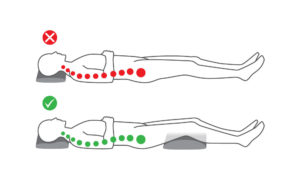Have you ever considered ditching your plush mattress for the hard, unforgiving surface of your bedroom floor? Perhaps you’ve heard whispers of the health benefits associated with a minimalist lifestyle, or maybe you’re simply trying to save money. Whatever your reasons, you’re not alone in pondering the merits of floor sleeping. But before you roll out your sleeping bag and bid farewell to your cozy bed, consider this: Can sleeping on the floor actually cause lower back pain?

Image: viewfloor.co
The answer, like many things in life, isn’t a simple yes or no. While some individuals find that a firmer sleeping surface alleviates their back pain, others experience the opposite effect. The truth is, sleeping on the floor isn’t inherently good or bad for your back. It all boils down to individual circumstances, your unique anatomy, and how your body responds to different sleeping positions.
The Potential Benefits of Sleeping on the Floor
For some individuals, sleeping on the floor can provide several benefits:
- Improved spinal alignment: A firm, flat surface can help to promote proper spinal alignment, especially for those who suffer from chronic back pain or scoliosis.
- Reduced pressure points: By eliminating the sinking sensation associated with plush mattresses, floor sleeping can help to reduce pressure on sensitive areas, like your hips and shoulders.
- Enhanced circulation: A flatter sleep surface can encourage blood flow, which may benefit overall health and well-being.
- Minimal dust and allergens: As a bonus, you might find that sleeping on the floor exposes you to fewer dust mites and allergens than a mattress.
The Potential Drawbacks of Sleeping on the Floor
While floor sleeping can hold some appeal for certain individuals, there are also potential drawbacks to consider:
- Increased risk of discomfort: Adapting to the firmness of the floor may lead to temporary discomfort, aches, and stiffness.
- Less support: The lack of cushioning and support may place extra strain on your back, especially if you sleep on your side.
- Limited comfort: The unforgiving nature of the floor can be difficult to adjust to, especially for those used to a plush mattress.
- Potential for injury: Floor sleeping can increase the risk of falls and injuries, particularly for older individuals or those with mobility issues.
Factors Influencing Lower Back Pain
Here’s the thing: Back pain is a complex issue. It can be caused by a variety of factors, including:
- Poor posture: Whether you’re seated at a desk or sleeping in an awkward position, poor posture can put stress on your back muscles and ligaments.
- Weak core muscles: Strong core muscles play a crucial role in supporting your spine. Weakness in these muscles can contribute to back pain.
- Injuries: Past injuries, such as a herniated disc or a strained muscle, can leave you prone to back pain.
- Medical conditions: Conditions like arthritis, osteoporosis, and even fibromyalgia can cause pain in the lower back.

Image: www.qispine.com
How Body Mechanics Impact Back Pain
The way you sleep can have a significant impact on your back.
- Sleeping on your back: This position is typically considered the best for spinal alignment, as it keeps your spine straight. However, if you have any neck pain, sleeping on your back may exacerbate it.
- Sleeping on your side: This position can provide support for your spine, but it’s crucial to position yourself correctly. Use a pillow to support your neck and knees, keeping your spine aligned.
- Sleeping on your stomach: This position can put a lot of strain on your lower back. It’s not recommended for people with back pain, as it can lead to neck pain and stiffness.
The Importance of Personalized Sleep Solutions
There’s no one-size-fits-all approach to sleep. What works for one person might not work for another. Instead of blindly jumping on the floor-sleeping bandwagon, take the time to reflect on your own needs and preferences.
- Consult a healthcare professional: If you’re experiencing chronic back pain, consult a doctor or physical therapist to pinpoint specific causes and discuss potential solutions.
- Experiment with different sleep surfaces: Find a sleep surface that provides adequate support without sacrificing comfort. This might mean investing in a firm mattress, exploring different pillow options, or even trying out a floor mattress.
- Pay attention to your body: Listen to your body and how it responds to different sleep positions and surfaces. If you wake up feeling stiff or sore, consider changing your sleep habits.
Can Sleeping On The Floor Cause Lower Back Pain
Sleeping on the Floor: A Bottom Line
While sleeping on the floor might seem like a simple solution for back pain, the reality is much more nuanced. There are potential benefits and drawbacks to consider, and personal factors play a significant role in determining what works best for you. Remember, a healthy back relies on a combination of factors, including proper posture, a healthy weight, and regular exercise.
If you’re considering floor sleeping as a way to address your back pain, consult with a healthcare professional to develop a personalized solution that suits your unique needs. Your body will thank you for it.





